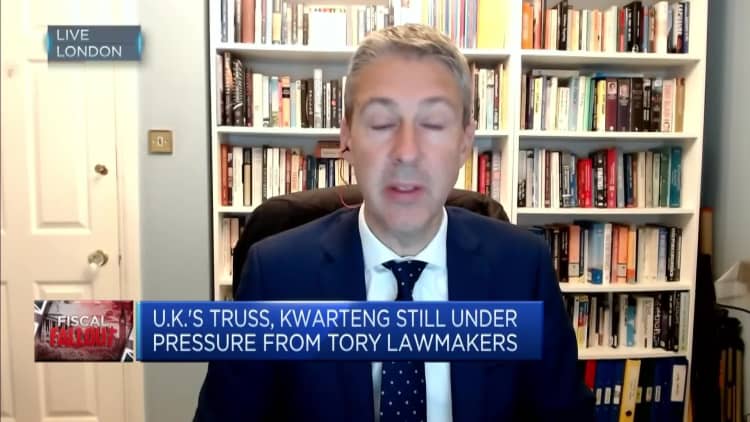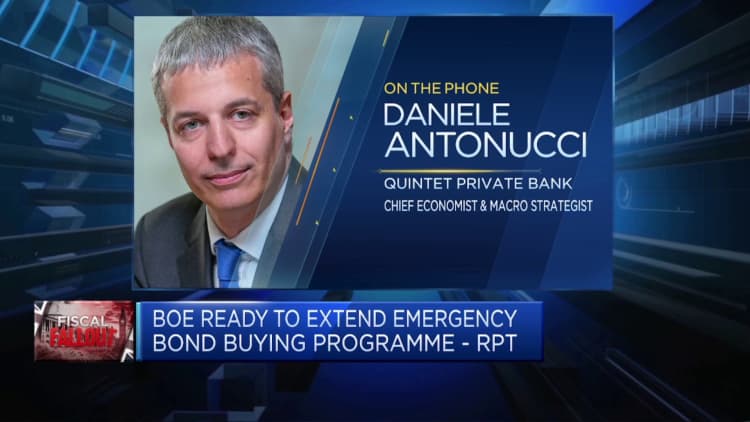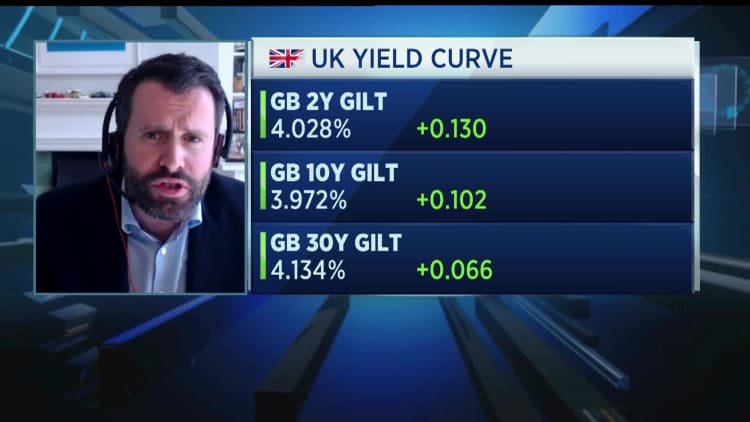Pensioners protest over rising fuel prices at a demonstration outside Downing street called by The National Pensioners Convention and Fuel Poverty Action on February 7, 2022 in London, England.
Guy Smallman | Getty Images
LONDON — “The brains of humans and other animals contain a mechanism designed to give priority to bad news,” former Nobel Prize-winning economist Daniel Kahneman once said.
For Brits, this mechanism has been taking a beating in recent months.
The Bank of England this week added to its emergency rescue package for British pension funds, while the government brought forward its medium-term fiscal policy plan, having plunged the markets into chaos with its widely-criticized announcements last month.
A number of pension funds were hours from collapse when the central bank intervened on Sep. 28, and policymakers continue to battle against market volatility with further expansions of the bond-buying scheme on Monday and Tuesday.
The spike in interest rate expectations following new Finance Minister Kwasi Kwarteng’s so-called “mini-budget” also caused mayhem in the mortgage market, leading banks to withdraw products and rates to surge for prospective homeowners.
Meanwhile the British pound fell to an all-time low against the dollar in the aftermath of Kwarteng’s policy announcements, only regaining some ground when the government U-turned on some of its most radical policies, such as the abolition of the top rate of tax for the country’s highest earners.
Kwarteng on Monday announced that his scheduled expansion on last month’s controversial fiscal plans — and an independent assessment of their impact from the Office for Budget Responsibility — would be brought forward by three weeks to Oct. 31, as the Treasury and the Bank of England look to temper market concerns and restore credibility.
The same day, the central bank is expected to begin selling gilts (U.K. sovereign bonds), part of its delayed quantitative tightening efforts as it unwinds pandemic-era monetary stimulus in the hope of tackling runaway inflation.
Economists expect further volatility in the bond market, and peril for pension funds, in the coming weeks ahead of the full budget statement, while the Bank of England continues to walk a tightrope between ensuring fiscal stability and reining in inflation.
‘The recession has begun’
The U.K. is the only G-7 economy not to have re-attained its pre-pandemic GDP level by the second quarter of 2022, Citibank Chief U.K. Economist Benjamin Nabarro pointed out in an Institute for Fiscal Studies event on Tuesday.
The U.K. economy shrank by 0.3% in August, the Office for National Statistics estimated Wednesday, potentially beginning what economists expect will be a lengthy recession through the winter.
The ONS said GDP was only just returning to its pre-pandemic level, highlighting the challenge facing Prime Minister Liz Truss’ “growth, growth, growth” agenda. The prime minister has committed to a radical overhaul of the country’s economic policy, vowing to address anemic growth over the past decade or more, despite her party having been in power since 2010.

The government’s growth plan must also overcome the impact of Brexit, which most economists project will reduce real per capita GDP. The government’s independent Office for Budget Responsibility (OBR) calculated that Brexit would reduce the U.K.’s potential productivity by 4% over the long term, while the OECD projects that the U.K. will have the lowest growth in the G-20 in 2023, apart from heavily sanctioned Russia.
“Real GDP is likely to retreat again in September in line with double-digit inflation eroding household purchasing power and the resulting output loss from additional bank holiday to coincide with Queen Elizabeth’s funeral on Monday 19 September,” said Raj Badiani, economics director at S&P Global Market Intelligence.
Queen Elizabeth II, the world’s longest-reigning monarch, died on Sep. 8 after 70 years on the throne, ushering in 10 days of national morning and a public holiday on the day of her funeral.
“We now believe the recession in the U.K. has begun in the third quarter of 2022 and will likely last for three quarters. Our near-term GDP outlook anticipates a recession spilling into 2023 because of a tight and prolonged squeeze on household budget fueling a consumer-led recession,” Badiani added.

S&P also expects the economy to contract over the full year of 2023, despite substantial fiscal stimulus such as the government’s energy price guarantee and income tax cuts, due to rising household borrowing costs, softer demand in critical export markets and persistent volatility in financial markets.
The latest labor market statistics showed U.K. unemployment falling to 3.5%, its lowest rate since 1974, fueled by a rise in the inactivity rate, which now stands at 21.7%.
From June to August, annual growth in average total pay (including bonuses) for employees was 6% while growth in regular pay (excluding bonuses) was 5.4%, representing a real terms decline of 2.4% and 2.9%, respectively.
U.K. inflation slipped slightly to 9.9% in August, with soaring food and energy prices having driven annual consumer price inflation to a 40-year high of 10.1% the previous month, but economists expect it to rise through the remainder of the year.
A worst-case scenario laid out by national electricity system operator the National Grid warned that households and businesses may face three-hour power outages over winter to prevent a collapse of the grid. However, senior cabinet minister Nadhim Zahawi told the BBC this week that this scenario is “extremely unlikely.”

Prime Minister Liz Truss is also coming under pressure from lawmakers in her own party to guarantee an increase to welfare benefits in line with inflation, with reports suggesting she could opt for raising them in line with earnings instead, heaping further pain on the country’s lowest-income households.
New research by British investment house Charles Stanley found that 22% of U.K. adults said they were having sleepless nights over market volatility, soaring inflation and the rising cost of living, while one in 10 said they had experienced panic attacks.
“Even under ‘precedented’ circumstances, financial pressures can get the better of us, but we’re living in unprecedented times, and the term ‘financial stress’ has taken on a whole new meaning,” said Lisa Caplan, director of OneStep Financial Planning at Charles Stanley.
“The cost of living crisis is having a detrimental effect on individuals, not only financially, but physically and mentally too.”
Widespread strikes
Postal workers, rail workers, journalists and public barristers have all carried out strikes in recent months in protest over pay and conditions, as wages fail to keep up with inflation running at around 10%.
Rail strikes carried out by members of the RMT union, in protest over pay and conditions have brought the country to a standstill on multiple days throughout the summer and into fall.
Members of the CWU (Communication Workers Union) also continue to strike, including 115,000 postal employees of former state monopoly Royal Mail. CNBC reported Friday that CWU representatives had entered into talks with Royal Mail executives, but 19 days of further postal strikes are still set to go ahead in the runup to the festive period unless substantial progress is made in the coming days.
Meanwhile, the Royal College of Nursing (RCN) is currently holding its first industrial action ballot in its 106-year history for 300,000 members, demanding a pay rise in line with inflation. The RCN cited new analysis from London Economics, which found that nurses’ real earnings have fallen at twice the rate of the private sector over the last decade.

The government imposed a minimum pay rise to most NHS staff of 4.5% in July, representing a real terms pay cut of more than £1,000 per year when adjusted for inflation.
Waiting times for access to the country’s National Health Service are at an all-time high, with public hospitals beset by staff shortages and a lack of beds.
The GMB union is also holding ballots for ambulance staff in various regions of the country, with paramedics’ real pay down £1,500 per year. Junior doctors will ballot for industrial action in early January, after the government refused to meet the British Medical Association’s demand to restore pay increases to 2008/9 levels by the end of September.
Junior doctors were excluded from the 4.5% NHS uplift, with the government instead imposing an increase of just 2%, which the BMA said is “derisory” in the face of the ongoing cost of living crisis and in the aftermath of the Covid-19 pandemic.
Source link



